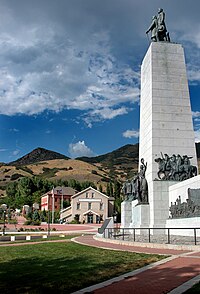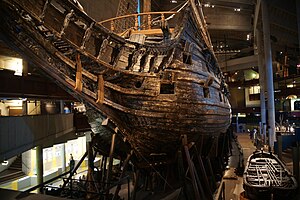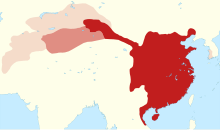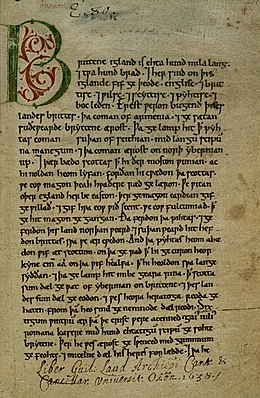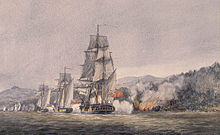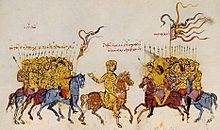Portal:History
The History Portal
History (derived from Ancient Greek ἱστορία (historía) 'inquiry; knowledge acquired by investigation') is the systematic study and documentation of the human past. History is an academic discipline which uses a narrative to describe, examine, question, and analyze past events, and investigate their patterns of cause and effect. Historians debate which narrative best explains an event, as well as the significance of different causes and effects. Historians debate the nature of history as an end in itself, and its usefulness in giving perspective on the problems of the present.
The period of events before the invention of writing systems is considered prehistory. "History" is an umbrella term comprising past events as well as the memory, discovery, collection, organization, presentation, and interpretation of these events. Historians seek knowledge of the past using historical sources such as written documents, oral accounts or traditional oral histories, art and material artifacts, and ecological markers.
Stories common to a particular culture, but not supported by external sources (such as the tales surrounding King Arthur), are usually classified as cultural heritage or legends. History differs from myth in that it is supported by verifiable evidence. However, ancient cultural influences have helped create variant interpretations of the nature of history, which have evolved over the centuries and continue to change today. The modern study of history is wide-ranging, and includes the study of specific regions and certain topical or thematic elements of historical investigation. History is taught as a part of primary and secondary education, and the academic study of history is a major discipline in universities.
Herodotus, a 5th-century BCE Greek historian, is often considered the "father of history", as one of the first historians in the Western tradition, though he has been criticized as the "father of lies". Along with his contemporary Thucydides, he helped form the foundations for the modern study of past events and societies. Their works continue to be read today, and the gap between the culture-focused Herodotus and the military-focused Thucydides remains a point of contention or approach in modern historical writing. In East Asia a state chronicle, the Spring and Autumn Annals, was reputed to date from as early as 722 BCE, though only 2nd-century BCE texts have survived. The title "father of history" has also been attributed, in their respective societies, to Sima Qian, Ibn Khaldun, and Kenneth Dike. (Full article...)
Featured picture
Did you know (auto generated)

- ... that Kim E. Nielsen trained as a historian of women and politics, and came to disability history and studies via her discovery of Helen Keller's political life?
- ... that American Colossus is a biography of a man who was "the most famous sportsman in the world" and "the most forgotten great athlete in American history"?
- ... that Dean Faithfull was the oldest player in NCAA Division II football history?
- ... that in 1920, Elmer Smith hit the first grand slam in World Series history?
- ... that the Picts disappeared from the historical record after the devastation suffered following the Battle of Dollar?
- ... that at over 400 pounds (180 kg), Desmond Watson is one of the largest players in NCAA Division I football history?
Thomas the Slav (Greek: Θωμᾶς, romanized: Thōmas, c. 760 – October 823) was a 9th-century Byzantine military commander, most notable for leading a wide-scale revolt in 821–23 against Emperor Michael II the Amorian (r. 820–829).
An army officer of Slavic origin from the Pontus region (now north-eastern Turkey), Thomas rose to prominence, along with the future emperors Michael II and Leo V the Armenian (r. 813–820), under the protection of general Bardanes Tourkos. After Bardanes' failed rebellion in 803, Thomas fell into obscurity until Leo V's rise to the throne, when Thomas was raised to a senior military command in central Asia Minor. After the murder of Leo and usurpation of the throne by Michael the Amorian, Thomas revolted, claiming the throne for himself. Thomas quickly secured support from most of the themes (provinces) and troops in Asia Minor, defeated Michael's initial counter-attack and concluded an alliance with the Abbasid Caliphate. After winning over the maritime themes and their ships as well, he crossed with his army to Europe and laid siege to Constantinople. The imperial capital withstood Thomas's attacks by land and sea, while Michael II called for help from the Bulgarian Khan Omurtag. Omurtag attacked Thomas's army, but although repelled, the Bulgarians inflicted heavy casualties on Thomas's men, who broke and fled when Michael took to the field a few months later. Thomas and his supporters sought refuge in Arcadiopolis, where he was soon blockaded by Michael's troops. In the end, Thomas's supporters surrendered him in exchange for a pardon, and he was executed. (Full article...)
On this day
November 20: Transgender Day of Remembrance
- 284 – Diocletian became Roman emperor, eventually establishing reforms that ended the Crisis of the Third Century.
- 1739 – War of Jenkins' Ear: A British naval force arrived at the settlement of Portobello in the Spanish Main, capturing it the next day.
- 1969 – A group of Native American activists began a 19-month occupation (graffiti pictured) of Alcatraz Island in San Francisco Bay.
- 1979 – Armed insurgents attacked and took over the Masjid al-Haram in Mecca, declaring that one of their leaders was the Mahdi, the prophesied redeemer of Islam.
- 1994 – In accordance with the Lusaka Protocol, the Angolan government signed a ceasefire with UNITA rebels in a failed attempt to end the Angolan Civil War.
- Carl Axel Arrhenius (d. 1824)
- Benoit Mandelbrot (b. 1924)
- Meredith Whitney (b. 1969)
- Ancel Keys (d. 2004)
Selected quote
Time's glory is to command contending kings,
To unmask falsehood, and bring truth to light.— William Shakespeare, playwright
Related portals
More Did you know...
- ... that on 26 April 1881 HMS Doterel (pictured) exploded, killing 143 of the 155 crew members?
- ... that causes of the deaths at the Berlin Wall included shooting, drowning, suffocation, suicide, and falling from a balloon?
- ... that the 19th-century swindler Bertha Heyman, known as "The Confidence Queen," conned men by pretending to be a wealthy woman who was unable to access her fortune?
- ... that only four great uncial codices have survived until the present day?
- ... that after World War II, Polish resistance organizer and Warsaw Uprising fighter Jan Mazurkiewicz was brutally tortured by the authorities in communist Poland?
- ... that tiny Paederus beetles may have caused some of the ten Plagues of Egypt?
- ... that the only known report of bloodshed during the simulated Nazi invasion of Winnipeg was from a woman who cut her thumb while preparing toast?
- ... that Dacian bracelets were used as currency and votive offerings?
Topics
Categories

History • By period • By region • By topic • By ethnic group • Historiography • Archaeology • Books • Maps • Images • Magazines • Organizations • Fictional • Museums • Pseudohistory • Stubs • Timelines • Chronology • People • Wikipedia historians
WikiProjects
![]() WikiProject History •
Ancient Near East • Australian History • Classical Greece and Rome • Dacia • Former countries • History of Canada • Chinese history • European history • Heraldry and vexillology • Indian history • Jewish history • Medieval Scotland • Mesoamerica • Military history • Middle Ages • History of Science
WikiProject History •
Ancient Near East • Australian History • Classical Greece and Rome • Dacia • Former countries • History of Canada • Chinese history • European history • Heraldry and vexillology • Indian history • Jewish history • Medieval Scotland • Mesoamerica • Military history • Middle Ages • History of Science
WikiProject Time • Days of the Year • Years
WikiProject Biography • Composers • Political figures • Saints • United States Presidents
Things you can do
 |
Here are some tasks awaiting attention:
|
Associated Wikimedia
The following Wikimedia Foundation sister projects provide more on this subject:
-
Commons
Free media repository -
Wikibooks
Free textbooks and manuals -
Wikidata
Free knowledge base -
Wikinews
Free-content news -
Wikiquote
Collection of quotations -
Wikisource
Free-content library -
Wikiversity
Free learning tools -
Wiktionary
Dictionary and thesaurus

